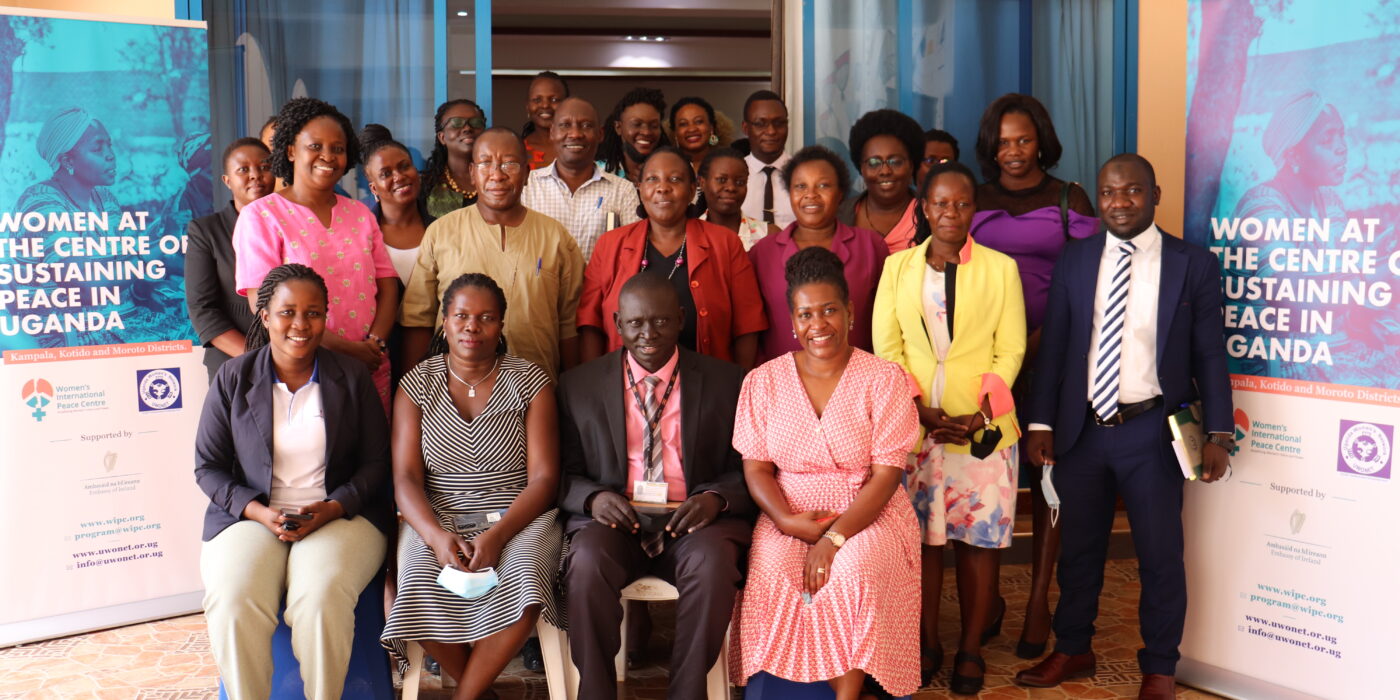Evidence shows that women are always affected by war and yet are usually left out of peace processes. With the increasing need to deepen understanding of women’s participation in peacebuilding and the UNSCR 1325 key pillars of participation, prevention, protection and refugee recovery, Women’s International Peace Centre and Uganda Women’s Network (UWONET) with support from the Embassy of Ireland partnered in an 8-month project “Women at the Centre of Sustaining Peace in Uganda” to promote the implementation of Uganda’s National Action Plan III (2021 – 2025) on Women, Peace and Security (WPS) at the national level and in Karamoja, particularly Kotido and Moroto districts.
On 15th February, the Peace Centre in partnership with UWONET convened district inception meetings in Kotido and Moroto with 48 stakeholders including Chief Administrative Officers (CAO), District Community Development Officers (DCDO), Resident District Commissioners (RDC), District Internal Security Officers, Mayors, Chairpersons Women Council, Women Peace Mediators / Monitors and Analysts.
These were later followed by a national inception meeting at Hotel Africana on March 10th 2022 that convened 30 participants with the objective of introducing the project to key national-level stakeholders for effective involvement and support of the implementation strategies.
The meeting introduced stakeholders to the project model, project goals and objectives, methodology, planned activities, project beneficiaries and the budget. It was noted that the project would directly address the gap of low awareness and uptake of Uganda National Action Plan III (UGNAPIII), centre women’s critical role & also focus on strengthening partnerships among civil society actors, government & stakeholders to collaboratively advance the WPS agenda and NAP III implementation.
Presentations also highlighted the four core goals of Uganda’s National Action Plan III on Women, Peace and Security which included; all forms of violence prevented and conflicts resolved; good governance enhanced at all levels; natural and human-made disasters prevented and mitigated; systems and structures for the implementation and coordination of the NAP III strengthened so as to ensure sustained peace and security through enhanced meaningful participation of women in peace and development processes.
Stakeholders were then urged to use the project to identify champions of peace from their communities who would play a vital role in peacebuilding and reporting early warning signs for conflict prevention and early response so as to mitigate conflicts from escalating.
In conclusion, the meeting enhanced a deeper understanding of the project model, the peace policy and NAP III with a focus on global and regional commitment, UNSCR 1325 on women, peace and security, NAP III priority outcomes, implementation costs, coordination structure, progress, challenges and proposed recommendations.
This facilitated project buy-in by national-level stakeholders who made key suggestions for effective project implementation and continuous stakeholder engagement.
The following were the recommendations made;
(i) There is a need for an inclusive consortium for a collective process that revitalizes efforts towards pushing for the passing of the peace policy.
(ii) There is a need to build on the already existing work done by different entities and synergise around the work done on WPS with UN Women.
(iii) Stakeholders to organise and meet with the key influential women in key positions like the Vice President and Prime Minister that can advocate for the passing of the peace policy from a higher level.
(iv) Consider having partners that offer protection for human rights defenders in the consortium since peacebuilders are targeted by warriors in may need protection.
(v) Synergize with other CSOs for collective advocacy towards the passing of the peace policy and implementation of the NAP III.
(vi) Explore the other government laws/framework for effective implementation and the possibility of tracking implementation through the Transitional Justice Policy, National Development plan and district development plans.



